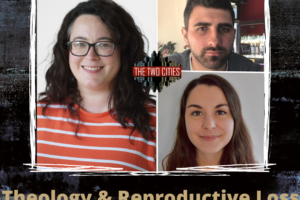It’s been seven months since I have been involved in Biblical-Academic pursuit. In that time I’ve transitioned to a fairly normal blue-collar job, taken up interest in a career path in fitness (shameless plug: if you’re looking for coaching, I do Powerlifting, Bodybuilding and General Fitness!), got engaged and started planning a wedding. My primary focus has shifted away from scouring through libraries to making long-term financial goals, figuring out how to plan a date now that I have reasonable income to plan one with, and spending time with people who would respond “escha-what?” While each of those transitions could be a post on its own, the final one has been on my mind the most and drastically honed my aspirations as an aspiring theologian.
I left my bubble of theologically trained peers, and mostly believing peers, and have found myself among people who fall into a variety of different general camps: non-believers and openly mocking (not hostile though), non-believers and utterly indifferent, non-believers but curious, and then believers who, by academic standards, would be fit for their freshman intro theology classes. But differences outside of the Biola bubble are hardly restrained to just theological differences. I’ve made friends with people who speak zero English (and have graciously put up with and helped teach me more Spanish), ex-convicts, impressively resilient party people, people working multiple jobs while living in motels, and just average people who are parents, still living at home, or just a run-of-the-mill average person. The concerns are largely the same: pay bills, try to save money, enjoy life, hope for some upward social mobility, and do better than they did the year before.
Clearly, the demographic is wholly different. After being in the environment at Biola for as long as I had been, it was as much a culture shock leaving as it had been when I first attended Biola. People are rarely concerned with the metaphysical, and when they are, it is not a detached subject of inquiry. It is usually because it has deeply affected them, and if there’s a God, they’re looking for answers from him. They’re not looking for answers that any systematic theologian can concoct, which is often mechanical, awkward, and detached.
I had the opportunity to talk with someone about Jesus for about seven hours straight (I was teaching him how to process the latest shipment in our warehouse). I can tell you now, there was a slight wave of panic when he asked, “Wait, so how is Jesus also God, but God is God, and the Holy Spirit is God all at once but different?” Dogmatics and systematics were not going to be very satisfactory answers, clearly. Similarly, explaining the concept of the hypostatic union was a bit of a doozy as well. We continued talking, and he continued asking about some common questions like why there was evil in the world, would God really forgive people if they did x, y, or z, who does Jesus care about, etc. These stories were never divorced from circumstances he had personally experienced. When asking about who Jesus cared about, it was tied to a story about a church ministry he had received. When the church ministry was done, he overheard a woman saying, “Wait, we need them to get a picture with our people too!” While the woman had likely seen her comment as innocuous and well-meaning, he had interpreted it as it meaning that the people being helped were just advertisements to show off to everyone else saying, “Hey, look, we helped poor people, look at us!” His concern was essentially, “Am I just a means to an end? Am I just part of a checklist meant to make them feel good? Would I be worth anything if I wasn’t poor?” Naturally, he had questions about who God cared about, and if/why he was concerned for the poor.
In the days following I began to remember warnings from my theology professors, and even the book “A Little Exercise for Young Theologians”, and began to think of the crucial points.
- The Bible is not something to stand over and scrutinize, but to stand under and learn from.This is not to say the pursuits of text criticism etc., need to be done away with. Rather, it is to say that Scripture is something that needs to be internalized, understood, and able to be explained to people. It is not a document to simply be systematized and regurgitated, though there is no harm in being able to construct categories and recite them. But if the pursuit ends when one simply has “mastered” Scripture, I think it often leaves one worse off than if they had never started at all, and it certainly is harmful when coldly recited to someone who is suffering (truth is not the summation of love, and simply speaking truth is not loving. Love is more dynamic than that).
- If theology becomes only an intellectual pursuit and is never internalized, it will produce nothing.Similar to above, theology almost has to become something you feel. It is not simply something you access outside of yourself, but is something that becomes a part of you. There is a world of difference between Jesus being the empathetic High Priest technically or theoretically and Jesus being the empathetic High Priest who has intervened on your behalf, and the behalf of others. For example, there is a world of difference between knowing my friend and fellow writer, Logan, is capable of playing Freebird on the fly and actually standing in the room with him yelling about Freebird and playing it.
- In tandem with #2, theology that does not help the suffering is not worth having at all. This is not to say any theology that does not directly address suffering is useless. It is to say that theology which remains in abstract categories is likely not worth the time. Exceedingly large amounts of time dedicated to things like Supra/Infralapsarianism fail to produce fruit for those who are suffering, and creates sharp disconnects between those “doing” theology and those in need of ministry. Understanding things like the atonement, Jesus being fully man and fully God, the Trinity, the fall of humanity, the redemption of humanity, suffering, sanctification, justification, etc., all can be brought to someone who is suffering or struggling, but they must be brought in unique ways appropriate for unique situations.
Theology cannot be simply regurgitation because theology is meant to communicate things about God, and communication, for our purposes, is meaningless if it cannot be understood, received, or applied. Jesus is not the God who forgives generally. He is the God who forgives us generously and particularly. Jesus is not the one who takes anxieties because he cares for people generally. He is the one who takes my anxieties about finances, self-worth, my future, and competency specifically. If God has decided, and we know he has, to be “God with us” in Jesus, then our theology of him will always contain implications for us as well. We do not know of God’s love and mercy generally but specifically as it is revealed in Jesus Christ. In some sense, theology is not final in its abstraction, but in its relation. God does not possess the quality of being “The Redeemer” in an abstract sense, but the God who is the particular redeemer of each person – when the rent is due, when one has been diagnosed with illness, even when one simply has a bad day. God is who he is in relation firstly to himself as the Trinity, and then to us as we know him in Jesus Christ. If he has decided that he should be known in relationship to us, then our theology should be done likewise.
My recent tenure in academics was certainly valuable. I doubt I would have had answers for my friend had I not gone through it. But it can never teach one to fare outside of the bubble it creates for itself. Thankfully I had professors who spent much time concerned with forcing us to think of implications, pushing past intellectual assent to abstract notions. To them, I am undoubtedly grateful. I hope this challenges those who read to think about theology in relation to those who need to hear about the Gospel in reference to their lives.





Leave a Reply
Your email is safe with us.